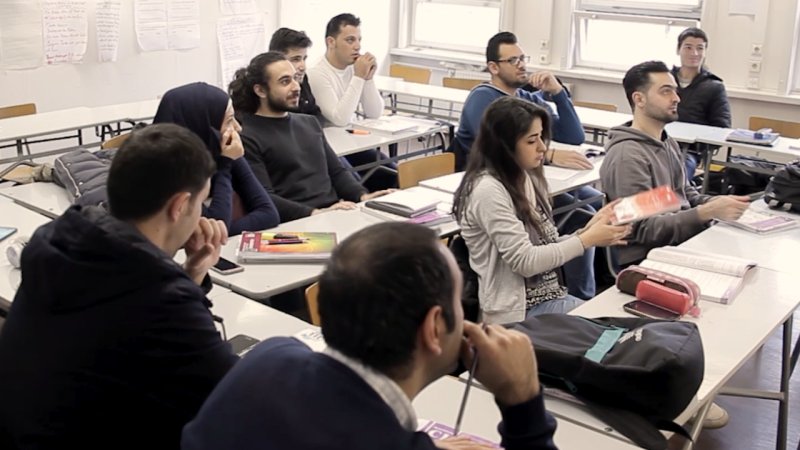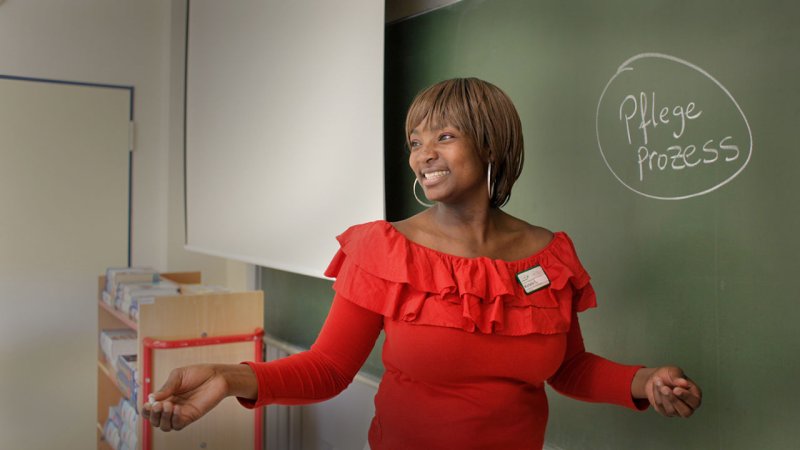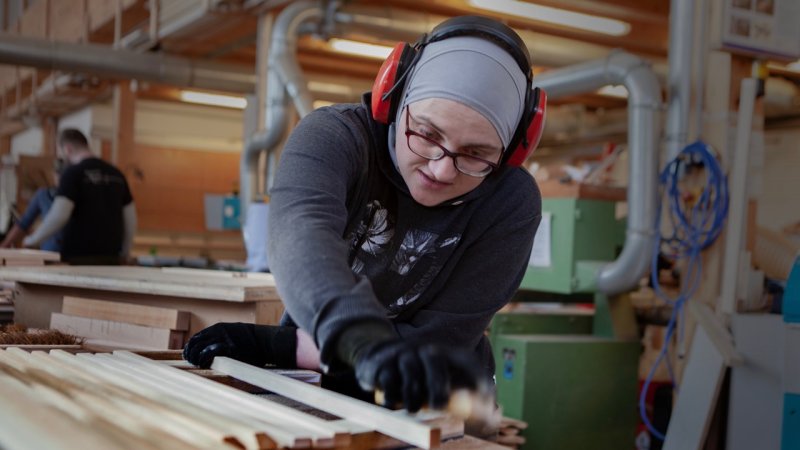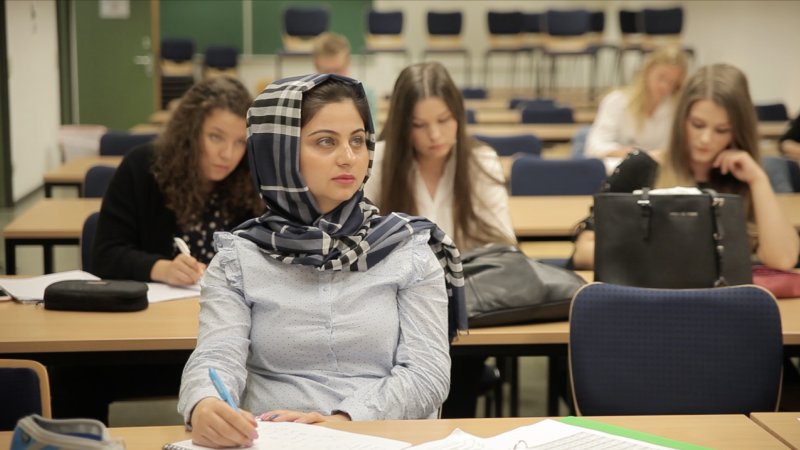
There are various ways to learn German and improve your proficiency, even if you are not (yet) allowed to attend an integration- or vocational language course. Here we show you which possibilities you have to learn the German language cost-free or at an affordable cost.
There are many cost-free German courses, mainly organised by volunteers. Teachers in these courses are often not professional educators, but people who would like to help the newcomers in Germany. Most of these courses are for beginners, but there are also courses for more advanced German learners. For some of these courses, you have to register, but in others, you can just go there on the designated dates and participate. On our Local Search page, you can search for a free German course nearby. If you cannot find any free German courses around, ask a Migration Counselling centre or the Youth Migration Service for help. In some cities, Adult Education Centres (“Volkshochschule”) offer free German courses for refugees.
In addition, many universities offer German courses for refugees. Most of these university courses are cost-free, as they are either funded by the respective university or the German Academic Exchange Service (DAAD). Some of these courses aim to prepare the participants for studying at the respective university. In others, you may participate without any further requirement. If there is a university or college in your city, visit their website and search for 'Angeboten für geflüchtete Menschen' or contact the International Office, the Language Center ("Sprachenzentrum") or The Centre for Applied Linguistics and Special Languages ("Fachsprachenzentrum") in the university directly.
German courses in official language schools, such as the Goethe Institute, are often quite pricey, and you usually have to pay for them personally. The language courses in Adult Education Centres ("Volkshochschule" or VHS) are another affordable alternative. Adult Education Centres are available in almost every German city. If you have a job and need to advance your knowledge of German to handle your day-to-day work better, you may ask your boss if he/she is willing to pay for your German course within the framework of further education or "Weiterbildung".
Please note: Some German foundations and universities provide scholarships for advanced German-learners. For example, the Institute for International Communication (IIK) in Düsseldorf offers several scholarships per year for their different types of summer courses (starting from B1). If you are enrolled at a university and have been living in Germany for less than 15 months, you are eligible to apply for a language scholarship at the German Academic Exchange Service (“Deutscher Akademischer Austauschdienst” or DAAD). As an academician, you can also apply for a fellowship at the Humboldt Foundation if you are planning to continue your research in Germany. Humboldt Foundation offers scholarships for intensive German courses, among other things, but their academic selection criteria are quite strict.
There are often many volunteers in the so-called language cafés ("Sprachcafés" or language meet-ups) who can help you learn German. In the language cafés, you can meet other people and speak German with them to practice and learn new words. You may also find new friends in these cafés and meet-ups. Here, it does not matter if you are a beginner or an advanced-learner; everyone can take part in these often small groups and speak German with others.
On our Local Search page, you can search for a language café nearby. If you cannot find any free German course around, ask a Migration Counselling centre or the Youth Migration Service for help.
You can also look for a tandem partner. A tandem partner is a person who speaks German very well and wants to learn your language. Tandem partners meet and try to exchange their knowledge of their respective language by talking together, so this is a win-win situation: you learn German, and the other person can learn your language cost-free.
You can search for a tandem partner in your area on our Local Search pages. If you cannot find anyone, ask a Migration Counselling Centre or the Youth Migration Service for help.
You can search for a tandem partner in your area on our Local Search page. If you cannot find anyone, ask a Migration Counselling Centre or the Youth Migration Service for help. There is also the option of forming a tandem online. On Tandem.net/de, you can search for tandem partners worldwide and improve your language skills with the help of native speakers.
A “Patentschaft” or mentorship is a great opportunity if you want to improve your German language skills and settle into society. Through regular contact with a mentor or through everyday interactions and cultural exchange, you can properly practice the language. Local organisations, associations and online platforms can help you find a mentor. These mentorships can be quite effective if you do activities together, are patient and set goals for language learning. Successful examples show how helpful this support can be. You can find out more about mentorship programmes in our chapter “Social Mentoring”.
There are various ways to practice German independently and online:
- The website dw.com and the Adult Education Centre's portal will help you learn German - regardless of your current knowledge of the language. Here, you can learn German vocabulary and grammar and practice listening comprehension, reading and writing.
- At deutschakademie.de and deutsch-lernen.com, you can complete online German courses of different levels free of charge.
- The Goethe Institute offers beginners and advanced learners various opportunities to learn and practice German. There you can also learn relevant vocabulary for specific professions.
- There is also a beginner's booklet that you can download for free in many different languages.
- At lernox.de, you can find many videos and exercise sheets on various topics that can help you learn German.
- On ondaz.de you will find interactive exercises on various grammar topics. You can also register there so that you can always keep an eye on your progress. In the "andere Webseiten" tab, you will also find links to other platforms on which you can practice listening comprehension, for example.
- At lunes.app, you can download a free vocabulary app, where you will mainly find German vocabulary relevant to training and work in different fields such as handicrafts, health care and office work.
- There is also the German course “Almani Be Farsi” with over 300 lessons for Farsi speakers and another one entailing various YouTube videos for Arabic-speaking people who would like to learn German.
A comprehensive overview of all audio and video materials for different language levels can be found on the website of the Alumniportals Deutschland. There you will also find learning materials which will help you to prepare for various German exams.
In public libraries, you will find many dictionaries and learning materials for improving your German. You can also study there in peace and (often also) surf the Internet. You can search for a public library nearby on bibliotheksportal.de. Membership is either free or pretty low-priced. Many libraries also have special offers for refugees. You can find out more at Library offers for refugees and asylum seekers.
The most important thing when learning a new language is practising. So: Dare to speak German! It is completely normal to make a lot of mistakes at the beginning. But you will still be understood and eventually become more fluent.
Deutsche Welle (DW) offers numerous online teaching materials and interactive programmes for all learners, from A1 to more advanced levels.
With the Lunes app, you can expand your German vocabulary to better understand and speak German at work.
On the BAMF website, you will find an overview of free offers to learn German online.
On our local search page, you can look for a German course nearby. Enter the name of your city and the words "German", "German Course" or "German Courses" as keyword to find courses in your area.
Die Plattform Little World verbindet Menschen, die Deutsch lernen wollen mit Ehrenamtlichen, die dabei helfen möchten.




